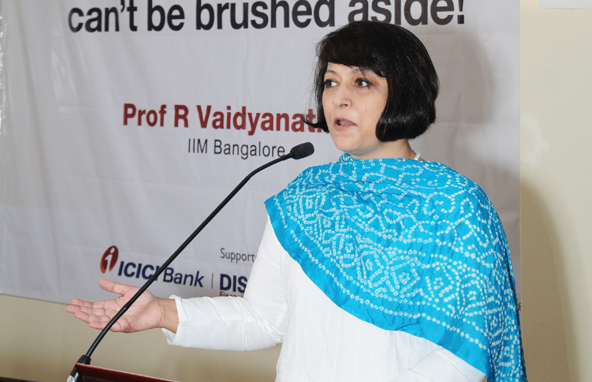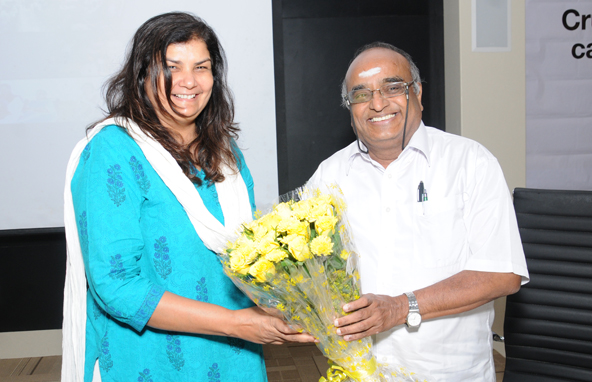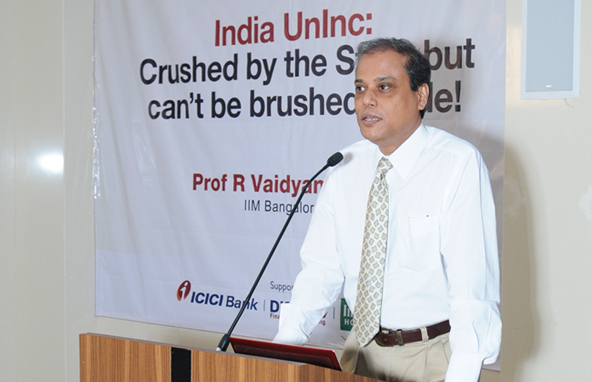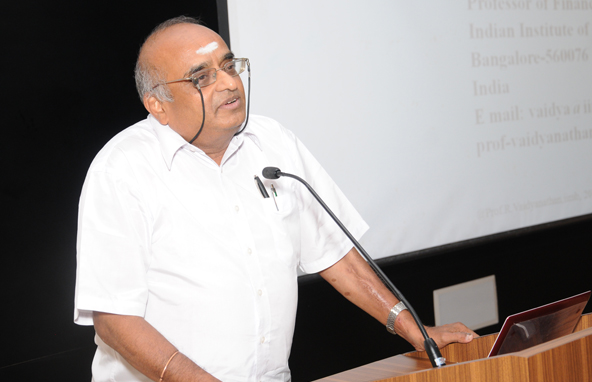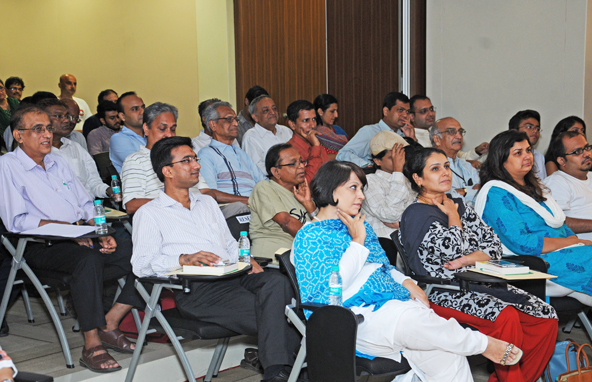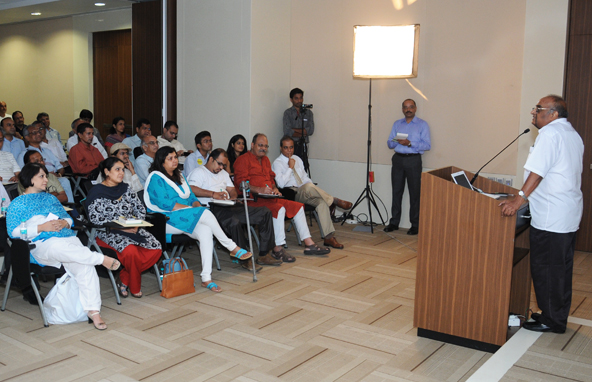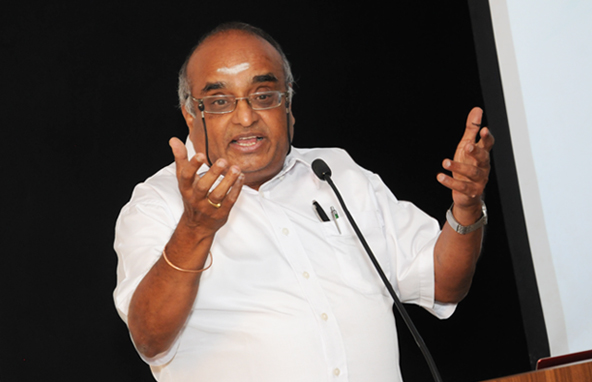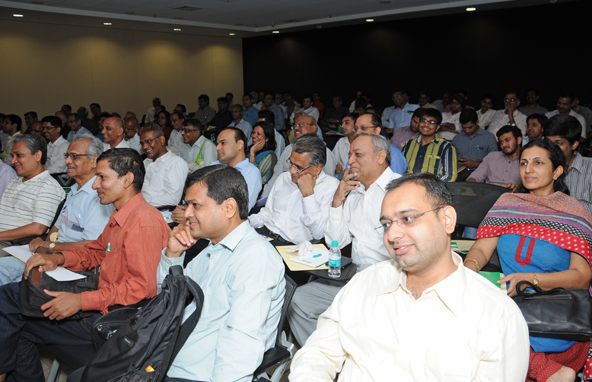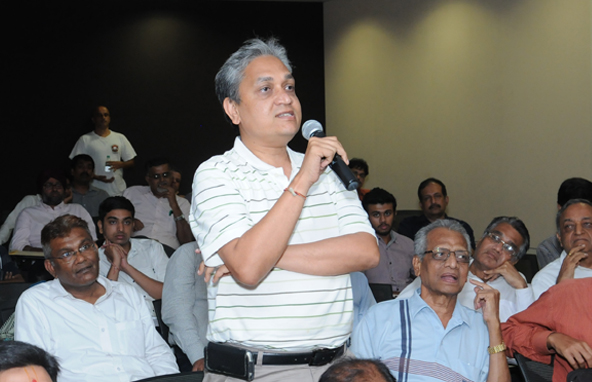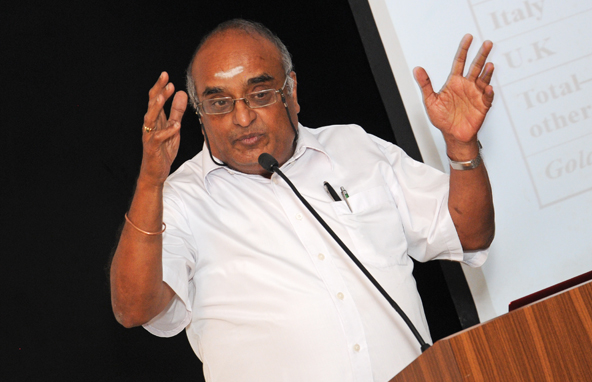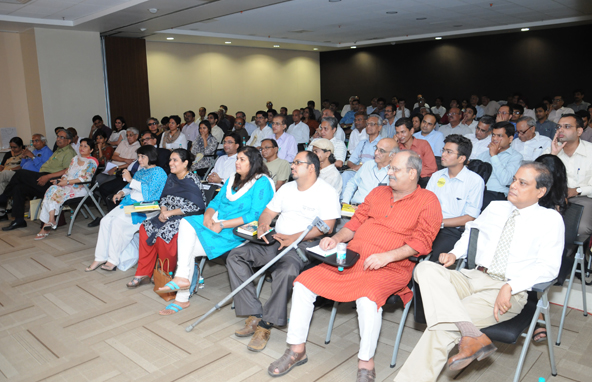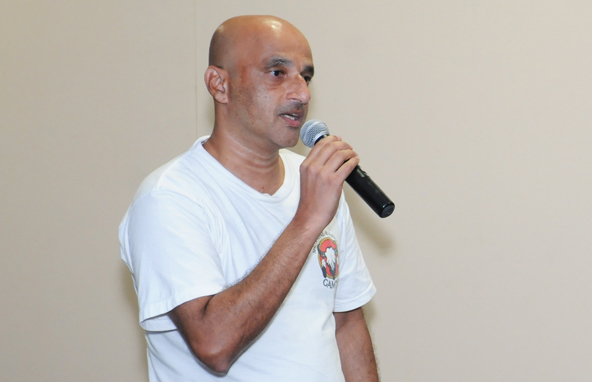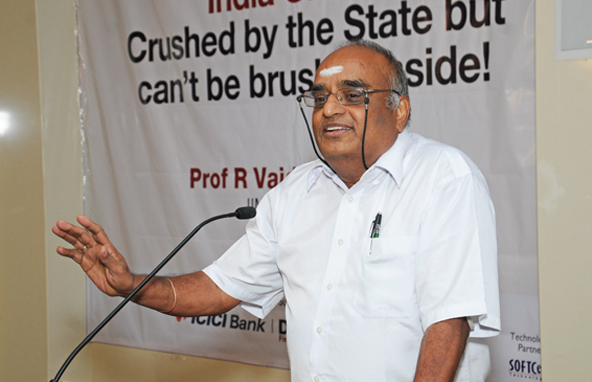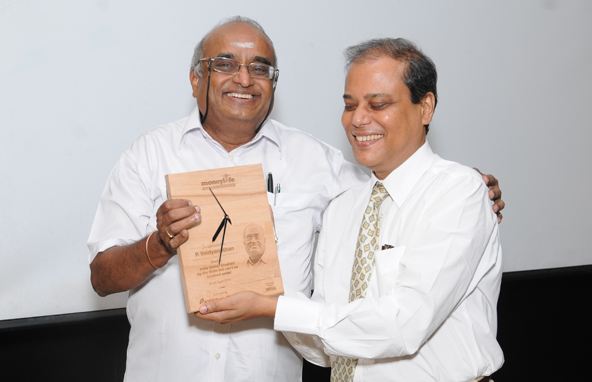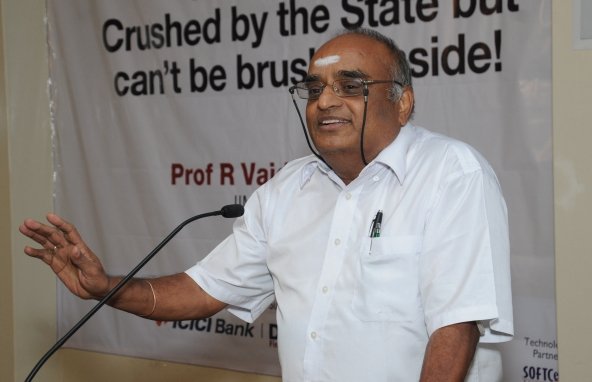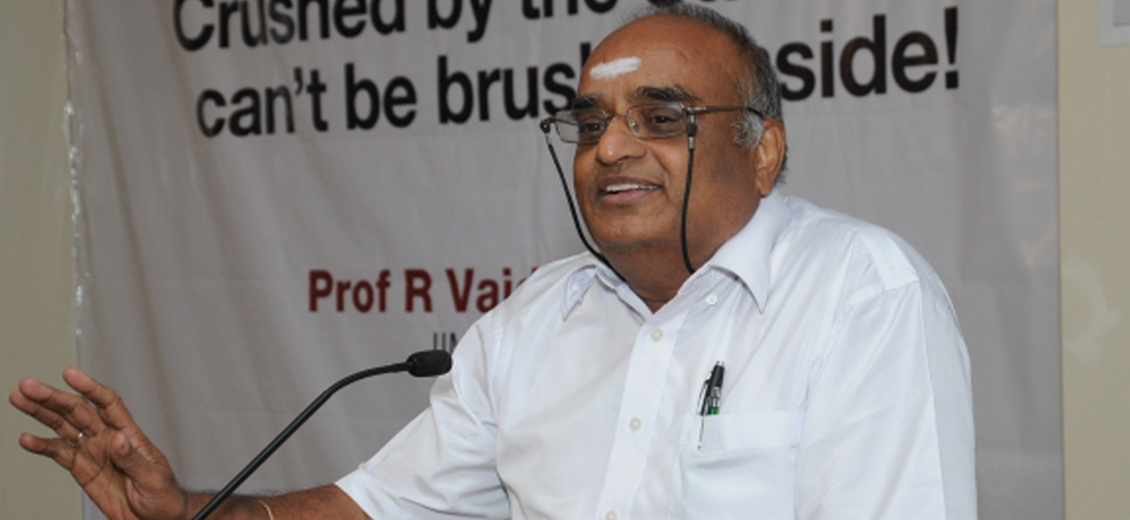
Indian women are responsible for the country’s growth with their humoungous ability to save money at all times. Similarly, contrary to views expressed by experts, India’s growth is primarily driven by partnership and proprietorship firms and not the corporate sector. And we need to respect these women savers and the so-called ‘unorganised sector’ for keeping us on the growth track, says R Vaidyanathan, the professor of Finance at Indian Institute of Management, Bangalore (IIM-B).
He was speaking at an interactive session organised by Moneylife Foundation in Mumbai. Prof Vaidyanathan, who has coined the term ‘India Uninc’ for the largest component of the Indian economy comprising small entrepreneurs, households, said, the arguments that the multi-national companies (MNCs) bring in ‘funds, efficiency and cost effective solutions are totally a mirage and lead to failed models.
“They (MNCs) access funds at a low cost from overseas and even from our domestic financial institutions by brandishing their parent company’s ‘letters of comfort’, which fetch them funds even below prime rates. While large corporates obtain large lines of credit with highly suspect credit appraisals, at prime lending rate (PLR) or base rates, soft loans and exotic facilities, a poor flower vending girl cannot open a no-frills account. To exapand her business she may be borrowing from a usurious money lender at 50%, or getting Rs45,000 up front for a loan amount of Rs50,000. More than 70% of the retail working capital requirements come from such non-bank sources,” he said.
Non-corporate sector –consisting of partnership, proprietorship and household enterprises constitute nearly 50% of Indian GDP while contribution of corporate sector or companies is just 15% of the GDP. The share of foreign direct investment (FDI) and foreign financial institutional investors (FFII) in Indian investment is not more than 7%. This means, 93% of the investment in India comes from domestic savings, out of which household saving contribute almost 80%.
These savings mainly come from the household sector; the role of institutional capital is limited. Explaining the reasons for such a large household saving, Prof Vaidyanathan said, “There are four basic reasons why Indian households, especially women save money. First is for the old age. Then, there are costs involved with education, healthcare as most of these people have to spend money from their own pocket. Indian ‘sanskar’ also plays a vital role in savings. This includes handing over wealth to next generation.”
“Day by day education is becoming more expensive. In fact, you need more money to secure admission in under KG or junior KG than higher education. Not to mention the ‘special terms and conditions’, like mother should be graduate or post-graduate and the family must be speaking English at home etc., implied upon needy parents,” he said.
Poking fun at education practices and loans, the Professor said, “I often argue with banks that they should provide such loans to parents seeking admission for their kids in under KG or KG classes rather than IIM or IIT. I mean, what is the point to provide loan for second and third floors when there is no money to build a foundation!”
According to Prof Vaidyanathan, another most important but hidden reason for household saving is corruption or bribery.
“The phenomenal bribes extorted by police, municipal babus and their minions are nothing but ‘organized dacoity’ and there is no escape from this, for businesspeople. In fact, small vendors and shopowners have to pay as much high as Rs20 on a daily income of Rs200 as bribe or hafta. That is 10% of gross income of these people.”
World economy and India
Earlier, speaking about the world economy, Prof Vaidyanathan said, based on the purchasing power parity, the share of emerging and developing economies is increasing, while the same for developed countries, like the G7 economies is falling.
According to The World Economy: A millennial Perspective—Angus Maddison OECD Development Centre Studies –2007, till 1820, China and India contributed more than 50% to the world GDP. However, after that, the share of both these contries started to fall while contribution from Western Europe, USSR, US, Latin America to world GDP increased till 1998.
But all these developed economies are burdened with huge debts due to non-saving culture. While India’s overall debt percentage of GDP is 122%, the same for Britain jand Japan is over 500%. The US (289%), Germany (287%), South Korea (315%), France (349%), Spain (366%), Italy (310%), Brazil (494%) are the other countries from ‘developed world’ that have huge debt to GDP ratio.
One of the major reasons for such kind of huge debt is the high household debt percentage of GDP in countries like Britain, Canada, US, South Korea and Spain.
According to Prof Vaidyanathan, another issue before these developed world is dwindling birth rate. Almost all these countries have a population that is growing in age or retiring from active earning. At the same time, there is no replacement or same numbers are not being replaced by new work force. This is leading to migration and then there are other issues emerging related with this.
Quoting The Economist, he said, during 2010, 40.8% of all births in the US were to unmarried mothers. What was illegitimate has become new normal. In UK, there are more households with TV sets than fathers. This means, sovereignty of family is disappearing and is being replaced by single parent, mostly women, family.
Another issue in these developed countries is rising unemploment. “Spain’s jobless rate for people ages 16 to 24 is approaching 50%. Greece’s is 48%, and Portugal’s and Italy’s, 30%. In Britain, the rate is 22.3%, the highest since such data began being collected in 1992. The comparable rate for Americans is 18%. and most of the unemployed youth do not have skills. Such scenario definitely create social problems, the Professor said.
Importance of India UnInc
According to Prof Vaidyanathan, the growth of the economy in the nineties should be attributed to the partnership and proprietorship (P&P) firms in service activities and not due to the reforms carried out by the government or the miniscule contribution of the corporate sector, but ironically this remarkable contribution of the P&P sector has not been documented and appreciated.
He said, unfortunately, the governments control and regulate an economic activity of these P&P firms or the unincorporated economy that it does not understand and tax it, if it is growing fast. This gargantuan appetite of the government goes against the grain of our civilisation ethos and negates the entrepreneurship of the non-corporate sector designated mini, small and medium enterprises. Its contribution to national savings hasn’t received the recognition because the aberration is due to it being wrongly labeled “household sector, though many of them notch turnovers running into hundreds of crores. The concept of capacity is cosmic and unlimited unlike western notions of limited capacity and possibility of increasing output only by increasing capital, Prof Vaidyanathan added.
FDI in retail trade- facts and fiction
Dissecting the myths and reality about FDI in retail trade, the Professor said, the trade is dominated by P&P firms. “The retail revolution that is applauded by planners, encouraged the government and eagerly talked by experts but not many seem to be worrying about the millions of retail traders, who will get marginalised. There is not much debate, let alone informed debate, among academics and other policy-makers about the far reaching implications that the entry of global retailers has on our economy, where the level playing field argument is meaningful and significant too,” he said.
Wholesale and retail trade contributes 16.6% to India’s GDP, which is next only to agriculture’s 17.5%. Livelihood of 30 million, including children and others, is involved in retail trade. About 120 million will be directly impacted by the so-called retail revolution (read FDI in retail), when real estate sharks will corner prime land to construct large malls by evicting retailers, Prof Vaidyanathan cautioned.
He said, “Many householders will then create small retail shops inside their homes with the help of surplus self-employed in-house labour with mini refrigerators to store just-in-time stock of cola and bundles of toilet paper rather than a major retail revolution with the razzle-dazzle of shopping in comfortable surroundings, computer generated unreadable printouts as a panacea for all problems. The arguments that the new outlets will remain open for longer hours unlike those in the West where they close early and on Sundays falls flat as the local next door mom-n-pop kirana shops manned by the efficient owner knowing and his family the customers’ tastes, requirements, price considerations offers free home deliveries and also extends credit. He opens at 7am and closes at 10pm every day for 365 days, but labeled ‘unorganized’ by our experts and the national income data to diminish his contribution. The customers don’t need to blow up fuel to drive miles away to go to the malls. The footfalls in these shops cannot be measured using western models [since there is no place to keep anybody’s foot inside his shop!] and so he is derided and abused. It is like clubbing housewives with prostitutes in our Census data to show them that they are involved in ‘unproductive’ activities.”
He said, Indian laws are being amended a thousand times to facilitate the grand entry of global malls and hypermarkets, some to permit the retail giants to procure directly from farmers at the agricultural market yards and not to trade in commodities, where transparency is doubtful. Indian brands like Reliance have encountered opposition in states like UP. In India, with mounting pressure presently 100% FDI is permitted in single brand and up to 50% in multi-brand. Wal-mart faces US Congressional investigations into allegations of bribery and corruption in India. Today, it is a hot election issue with parties like Bharatiya Janata Party (BJP) and Aam Admi Party (AAP) stoutly opposing the entry of retails giants in India.
Prof Vaidyanathan said he considers these economic constraints imposed by the West to be terminological terrorism mouthed ad-nauseam by economists and policy planners without understanding its implications, they want to open it up to global sharks in the name of liberalisation and kill the fast growing, productive, efficient and effective retail trade. “The sooner we strengthen our small business, the better for employment and society,” Prof Vaidyanathan concluded.


